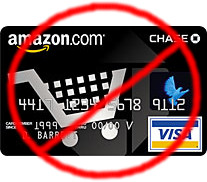WARNING: Avoid Amazon/CHASE equities and properties
 I’ve written about this before a little bit, but now it’s reached a head.
I’ve written about this before a little bit, but now it’s reached a head.
I call my credit card companies every few months and have them lower my APR and raise my credit limit, based on my stellar credit rating and spending history. All of my credit cards… with the exception of the Amazon/CHASE card, are well, WELL below 10% vAPR (prime + Xx.xx%).
My Amazon/CHASE card is Prime + 21.99%, based on the my credit report and my “other equities”.
I called them and after being bounced around on the phone through 6 different people, I finally was put in touch with an “account manager” (the second one I’d spoken to on that call) who said it was..
“related to my other credit cards, the spending on those cards, the APR of those cards, and also any other loans or bills I pay for with income or earnings”.
This includes a car loan, telephone bill, utilities bill and so on.
WHAT?!!!
So what they’re saying, is that because I have a stellar credit rating, and because I keep low balances on my other cards, have VERY low APR on those other cards, and have NEVER been late or missed a payment on any credit card or bill… that I’ve “earned the privilege” of being selected to have my APR tripled on my Amazon/CHASE card.
How lovely of them.
In fact, while I was on hold on the telephone, I logged onto myfico.com and bought my 3 credit scores online (if you use the code 7yrsale, you get 25% off of the cost because it is their 25th anniversary), and quoted those scores to the woman who I was speaking to. Because my credit rating is marked as “Very Good”, I’ve earned the right to have the APR of someone with a credit score rated as “Poor”.
Earlier this morning, I called another one of my credit card companies, and had them lower the vAPR that they were charging me (already below 10%), and they dropped it by another 3% to FAR below 10%, no problems, no questions asked, right there on the phone while I was talking to her.
Why does Amazon/CHASE insist on charging such a ridiculous APR? I did manage to squeak out one clue: Every credit card CHASE supplies is an “unsecured loan“, and so they make their customers suffer.
This goes right along with a documentary I saw recently called “Maxed Out“, which details how these companies continue to raise the interest rates to a level just beyond what people are able to reach, so they continue to pay their credit card payments for life, trapping them in a prison of credit card debt forever.
These companies don’t WANT you to pay off your debt every month, because you aren’t making them any money. If everyone paid their credit cards off every month, these companies would go bankrupt.
Instead, they make us go bankrupt.
If someone is down on their luck, and unable to pay their bills in a timely fashion, why should Amazon/CHASE raise the APR on their card, making it even harder for someone to pay the card? They should be LOWERING the rates, so people at least pay their payments at a lower APR, vs. having to default on their loans, causing chargeoffs and Amazon/CHASE to lose any chance they might have had at getting paid what they are owed.
Silly industry, pure silliness.
Anyway, I told the supervisor that I was going to pay out the card in-full this month, cut up the card and let the account remain open but idle forever (NOTE: you should never close credit card accounts if you have them paid off in-full, it hurts your credit score in very bad ways), and I was going to advertise and publish their “methods”, as well as tell people NEVER to use their equities or properties again, ever.
And so now I have.
They WILL scam you and change your account terms without notifying you… as they did to me.
You have been warned.

moraja said on April 23rd, 2008 at 9:56 pm quote
I had similar problems so I transferred my balance to another credit card which is offering 0% on balance transfers for 12 months. Now my balance on that card has gone overs 30%. Does that mean it is bad for my credit card?
David A. Desrosiers said on April 24th, 2008 at 7:16 am quote
Generally, yes. You never want to keep more than a 30% balance on your cards.
This means if you have a card with a $10k credit limit, you never want to exceed a $3k balance on that card.